|
Books Should Be Free Loyal Books Free Public Domain Audiobooks & eBook Downloads |
|
|
Books Should Be Free Loyal Books Free Public Domain Audiobooks & eBook Downloads |
|
Non-fiction |
|---|
|
Book type:
Sort by:
View by:
|
By: Anthony Trollope (1815-1882) | |
|---|---|
 The Life of Cicero
The Life of Cicero
Marcus Tullius Cicero (106-43BC) was an orator, statesman, philosopher and prolific correspondent, who rose as a ‘new man’ in Rome in the turbulent last years of its republican government. Anthony Trollope, best known as a novelist, admired Cicero greatly and wrote this biography late in life in order to argue his virtues against authors who had granted him literary greatness but questioned his strength as a politician and as a man. He takes a personal approach, affording us an insight into his own mind and times as well as those of his subject... | |
 Doctor Thorne
Doctor Thorne
MANUAL OF SURGERY, OXFORD MEDICAL PUBLICATIONSBY ALEXIS THOMSON, F.R.C.S.Ed.PREFACE TO SIXTH EDITION Much has happened since this Manual was last revised, and many surgical lessons have been learned in the hard school of war. Some may yet have to be unlearned, and others have but little bearing on the problems presented to the civilian surgeon. Save in its broadest principles, the surgery of warfare is a thing apart from the general surgery of civil life, and the exhaustive literature now available on every aspect of it makes it unnecessary that it should receive detailed consideration in a manual for students... | |
 Autobiography of Anthony Trollope
Autobiography of Anthony Trollope
Anthony Trollope's autobiography will delight you whether or not you've read (or listened to) any of his many works. His honest if self-deprecating tone is at times hilarious and at times piteously moving. His detailed descriptions of his writing process and his philosophy of writing as work rather than art are fascinating. Fans of Trollope will enjoy learning the man's perceptions of his novels' shortcomings and triumphs. Anyone will appreciate learning about his years devoted to churning out literature for profit while working full time with the post office. | |
 Hunting Sketches
Hunting Sketches
| |
By: Fyodor Dostoyevsky (1821-1881) | |
|---|---|
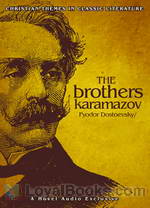 The Brothers Karamazov
The Brothers Karamazov
Set in 19th century Russia, The Brothers Karamazov (Russian: Братья Карамазовы) is the last novel written by the illustrious author Fyodor Dostoyevsky who died a few months before the book's publication. The deeply philosophical and passionate novel tells the story of Fyodor Karamazov, an immoral debauch whose sole aim in life is the acquisition of wealth. Twice married, he has three sons whose welfare and upbringing, he cares nothing about. At the beginning of the story, Dimitri Karamazov, the eldest son who is now a twenty-eight year old war veteran, returns to his home town to claim the inheritance left to him by his dead mother... | |
By: Niccolò Machiavelli (1469-1527) | |
|---|---|
 History of Florence and of the Affairs of Italy
History of Florence and of the Affairs of Italy
History of Florence and of the Affairs of Italy is an historical account by Niccolò Machiavelli. Toward the end of 1520, the Cardinal Giulio of Medici, later Pope Clement VII, offered Machiavelli the appointment to write a history of Florence. Although Machiavelli was reluctant to accept, accepting was his only way to regain the good graces of the Medici who had regained power and were in a position to offer him employment and protection. Doing the history also provided a way for Machiavelli’s views to become the “official” history of Florentine and Italian affairs. Once completed, the work was presented officially to Giulio, now Pope, in May of 1526. | |
By: James Allen (1864-1912) | |
|---|---|
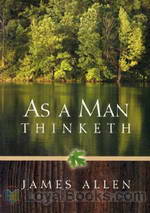 As a Man Thinketh
As a Man Thinketh
“A man is literally what he thinks, his character being the complete sum of all his thoughts,” is one of the quotes from James Allen's classic self help books, As a Man Thinketh. Published in 1902, it provides many more such insightful concepts on the power of thought and its effect on a human being's personality and behavior. This volume is more of a literary essay than a complete book and its title is based on a Biblical proverb, “As a man thinketh in his heart, so is he.” Taking this piece of ancient wisdom further, James Allen explores the far-reaching effects of the inner workings of a person's mind and motivation... | |
 The Way of Peace
The Way of Peace
The Way of Peace is your guide to the power of meditation; self and truth; the acquirement of spiritual power; the realization of selfless love; entering into the infinite; saints, sages, and saviors; the law of service; and the realization of perfect peace. | |
By: Walt Whitman (1819-1892) | |
|---|---|
 The Wound Dresser
The Wound Dresser
The Wound Dresser is a series of letters written from the hospitals in Washington by Walt Whitman during the War of the Rebellion to The New York Times, the Brooklyn Eagle and his mother, edited by Richard Maurice Burke, M.D., one of Whitman's literary executors. | |
By: Edith Nesbit (1858-1924) | |
|---|---|
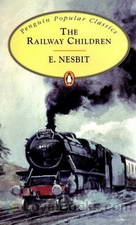 Railway Children
Railway Children
A thrilling spy story, a children's adventure, a charming portrait of early twentieth century life in London and the countryside and a heart warming family tale are all combined in this classic of children's literature The Railway Children by E Nesbit. The book has remained on the list of the best-loved children's books ever since it was first published as a serial story in The London Magazine in 1905. Later, it was published in book form and won acclaim from critics and readers across the world for its wonderful elements of character and plot... | |
By: Jean-Jacques Rousseau (1712-1778) | |
|---|---|
 Émile or, Concerning Education; Extracts
Émile or, Concerning Education; Extracts
| |
By: Abraham Lincoln (1809-1865) | |
|---|---|
 Lincoln at Cooper Union
Lincoln at Cooper Union
On 27 February 1860, Abraham Lincoln gave this address at the Cooper Union in New York City. When he gave the speech, Lincoln was considered by many to be just a country lawyer. After he gave the speech, he soon became his party’s nominee for president. | |
By: Jerome K. Jerome | |
|---|---|
 Stage Land
Stage Land
A comic look at the curious habits and customs of the inhabitants of ‘Stage Land’. Dedicated to ‘that highly respectable but unnecessarily retiring individual, of whom we hear so much but see so little, “the earnest student of drama” | |
 Idle Ideas in 1905
Idle Ideas in 1905
Back in 1905 Jerome K. Jerome shared his thoughts on a variety of subjects, including "Should Women Be Beautiful?", "Should Soldiers Be Polite?" and "Is The American Husband Made Entirely Of Stained Glass?". Every subject is analysed and commented on in the witty and satirical style we have grown to expect from the author. | |
By: Charles Darwin (1809-1882) | |
|---|---|
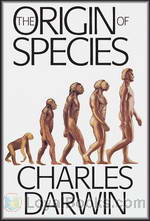 On the Origin of Species by Means of Natural Selection
On the Origin of Species by Means of Natural Selection
Considered to be one of the books that changed the world and how we view ourselves, On The Origin of Species by Charles Darwin was met with incredulous horror when it was first published in 1859. The revolutionary, almost blasphemous ideas it described were seen as antithetical to the existing ideas of Creation contained in the Bible and other religious texts. It was mocked, reviled and the author was personally subjected to vicious persecution by the establishment and theologians. In the years that followed its publication, the book became the subject of furious intellectual and social debate... | |
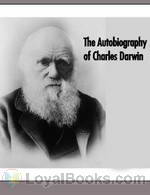 The Autobiography of Charles Darwin
The Autobiography of Charles Darwin
The Autobiography of Charles Darwin is the autobiography of the British naturalist Charles Darwin which was published in 1887, five years after his death. Darwin wrote the book, which he entitled Recollections of the Development of my Mind and Character, for his family. He states that he started writing it on about May 28, 1876 and had finished it by August 3. The book was edited by Charles Darwin’s son Francis Darwin, who removed several passages about Darwin’s critical views of God and Christianity... | |
 The Descent of Man and Selection in Relation to Sex
The Descent of Man and Selection in Relation to Sex
PART I. THE DESCENT OR ORIGIN OF MAN. Part 1 of 3 of book on evolutionary theory by English naturalist Charles Darwin, first published in 1871. It was Darwin's second great book on evolutionary theory, following his 1859 work, On The Origin of Species. In The Descent of Man, Darwin applies evolutionary theory to human evolution, and details his theory of sexual selection. The book discusses many related issues, including evolutionary psychology, evolutionary ethics, differences between human races, differences between sexes, the superiority of men to women, and the relevance of the evolutionary theory to society... | |
By: Arnold Bennett (1867-1931) | |
|---|---|
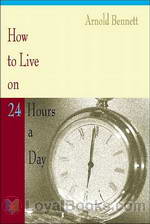 How to Live on Twenty-Four Hours a Day
How to Live on Twenty-Four Hours a Day
This book is a classic piece on self improvement teaching you to live to the fullest. Judging from the title of the book, the reader might expect that the book is a manual on how to manage your time better. Nothing could be further from the truth, this book is a flowery and witty self help book aimed at helping readers improve the quality of their lives, in fact it is one of the firsts of its kind in the world. Bennett describes the twenty four hours in a day as a miracle and that it should be used for the betterment of health, wealth, respect, pleasure and contentment... | |
 Literary Taste: How to Form It
Literary Taste: How to Form It
Arnold Bennett describes a method for enjoying literature, and suggests the contents of a comprehensive library. Chapters 1-10 and 14 describe his method for learning to enjoy literature. Chapters 11, 12, and 13 contain detailed lists of the 337 volumes required to complete a comprehensive library of English works. This reading is from the 1913 version at Project Gutenberg, and so does not contain the revisions made by Swinnerton for the 1939 edition, which included authors of the early Twentieth Century. Swinnerton’s revisions are available from Wikipedia. | |
By: Wilkie Collins (1824-1889) | |
|---|---|
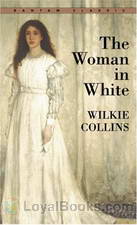 The Woman in White
The Woman in White
Wilkie Collins’s The Woman in White tells the story of two half-sisters, Laura Fairlie and Marian Halcombe who were embroiled in the sinister plot of Sir Percival Glyde and Count Fosco to take over their family’s wealth. It’s considered to be one of the first “sensation novels” to be published. Like most novels that fall into this category, the protagonists here are pushed to their limits by the villains before they finally got the justice they deserved. The story begins with Walter Hartright helping a woman dressed in white who turned out to have escaped from a mental asylum... | |
By: Plato (427BC - 347BC) | |
|---|---|
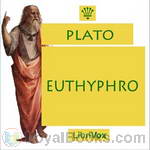 Euthyphro
Euthyphro
Awaiting his trial on charges of impiety and heresy, Socrates encounters Euthyphro, a self-proclaimed authority on matters of piety and the will of the gods. Socrates, desiring instruction in these matters, converses with Euthyphro, but as usual, the man who professes to know nothing fares better than the man who claims to be an expert. One of Plato’s well-known Socratic Dialogues, Euthyphro probes the nature of piety, and notably poses the so-called Euthyphro Dilemma: Do the gods love a thing because it is holy, or is a thing holy because it is loved by the gods? | |
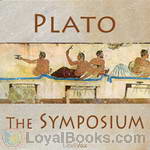 The Symposium
The Symposium
The Symposium (Ancient Greek: Συμπόσιον) is a philosophical book written by Plato sometime after 385 BCE. On one level the book deals with the genealogy, nature and purpose of love, on another level the book deals with the topic of knowledge, specifically how does one know what one knows. The topic of love is taken up in the form of a group of speeches, given by a group of men at a symposium or a wine drinking party at the house of the tragedian Agathon at Athens. Plato constructed the Symposium as a story within a story within a story... | |
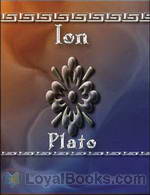 Ion
Ion
In Plato’s Ion, Socrates questions Ion on whether he should really claim laud and glory for his ‘rhapsodic’ recitals of Homer’s poetry. | |
 Timaeus
Timaeus
“Our intention is, that Timaeus, who is the most of an astronomer amongst us, and has made the nature of the universe his special study, should speak first, beginning with the generation of the world and going down to the creation of man…” ‘Timaeus’ is usually regarded as one of Plato’s later dialogues, and provides an account of the creation of the universe, with physical, metaphysical and ethical dimensions, which had great influence over philosophers for centuries following. It attributes the order and beauty of the universe to a benevolent demiurge – a ‘craftsman’ or god – fashioning the physical world after the pattern of an ideal, eternal one... | |
 Phaedrus
Phaedrus
“For there is no light of justice or temperance, or any of the higher ideas which are precious to souls, in the earthly copies of them: they are seen through a glass, dimly…”Socrates and his earnest friend Phaedrus, enjoying the Athenian equivalent of a lunchtime stroll in the park, exchange views on love and on the power of words, spoken and written.Phaedrus is the most enchanting of Plato’s Erotic dialogues (capitalised in honour of the god). The barefoot philosopher urges an eager young... | |
By: James Baldwin (1841-1925) | |
|---|---|
 Four Great Americans: Washington, Franklin, Webster, Lincoln. A Book for Young Americans
Four Great Americans: Washington, Franklin, Webster, Lincoln. A Book for Young Americans
Written for children, James Baldwin’s history of Washington, Franklin, Webster, and Lincoln brings these men to life in a way that will be interesting for adults as well. The stories touch on the little humanities of the great men, rather than dwelling on the great works and great events of their lifetimes, without ignoring the latter. | |
By: John Bunyan (1628-1688) | |
|---|---|
 Grace Abounding to the Chief of Sinners
Grace Abounding to the Chief of Sinners
Grace Abounding is the spiritual autobiography of John Bunyan, who also penned Pilgrim’s Progress, perhaps one of the most significant pieces of Christian literature, second only to the Bible. Grace Abounding follows Bunyan’s struggle to find true repentance and forgiveness, his battle with Satan’s temptations of unbelief, his comfort found in the Bible and his overarching victory gotten by the grace of God through Jesus Christ his Son. Readers familiar with Pilgrim’s Progress will recognize... | |
 Miscellaneous Pieces
Miscellaneous Pieces
John Bunyan (November 28, 1628 – August 31, 1688), a Christian writer and preacher, was born at Harrowden (one mile south-east of Bedford), in the Parish of Elstow, England. He wrote The Pilgrim’s Progress, arguably the most famous published Christian allegory. In the Church of England he is remembered with a Lesser Festival on 30 August. Bunyan became a popular preacher as well as a prolific author, though most of his works consist of expanded sermons. In theology he was a Puritan, but there was nothing gloomy about him. The portrait his friend Robert White drew, which has often been reproduced, shows the attractiveness of his true character. | |
By: John Milton (1608-1674) | |
|---|---|
 Areopagitica
Areopagitica
A prose tract or polemic by John Milton, published November 23, 1644, at the height of the English Civil War… Milton, though a supporter of the Parliament, argued forcefully against the Licensing Order of 1643, noting that such censorship had never been a part of classical Greek and Roman society. The tract is full of biblical and classical references which Milton uses to strengthen his argument. The issue was personal for Milton as he had suffered censorship himself in his efforts to publish... | |
By: Helen Keller (1888-1968) | |
|---|---|
 The Story of My Life
The Story of My Life
An autobiography of Helen Keller published when the author was still in her early 20's. The narrative reveals how her mind developed and matured until she began her studies at Radcliffe College | |
 The World I Live In
The World I Live In
The World I Live In by Helen Keller is a collection of essays that poignantly tells of her impressions of the world, through her sense of touch, smell, her imagination and dreams. My hand is to me what your hearing and sight together are to you. In large measure we travel the same highways, read the same books, speak the same language, yet our experiences are different. All my comings and goings turn on the hand as on a pivot. It is the hand that binds me to the world of men and women. The hand is my feeler with which I reach through isolation and darkness and seize every pleasure, every activity that my fingers encounter... | |
By: Benjamin Franklin (1706-1790) | |
|---|---|
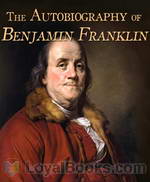 The Autobiography of Benjamin Franklin
The Autobiography of Benjamin Franklin
Inventor, author, printer, scientist, politician, diplomat—all these terms do not even begin to fully describe the amazing and multitalented, Benjamin Franklin who was of course also one of the Founding Fathers of America. At the age of 75, in 1771 he began work on what he called his Memoirs. He was still working on it when he died in 1790 and it was published posthumously, entitled An Autobiography of Benjamin Franklin. The book had a complicated and controversial publication history. Strangely enough, the first volume only was first published in French, in Paris in 1791... | |